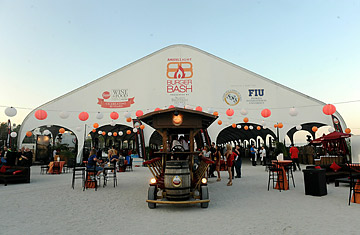
The Burger Bash was one of the events at the South Beach Wine and Food Festival held last weekend in Miami Beach
Go to the official site of the South Beach Wine and Food Festival (SOBE) held this past weekend, and you'll see the marks of wild success. Nearly every event is sold out. The highbrow events are sold out, the populist events are sold out. The events that boast Guy Fieri and Giada De Laurentiis are sold out, the Alain Ducasse tribute dinner is sold out. I was just there, and the crowd was by no means composed of gastronomes. The surgical enhancements on display would have done credit to the Adult Video News Awards, and I am pretty sure I saw the Situation's grandfather at the Rachael Ray Burger Bash.
What started as a fun vacation 10 years ago is now a supercluster of celebrity chefs, Food Network stars, Bal Harbour grandees, trophy wives, cooking demos, pounding techno music, amazing dishes, not-so-amazing dishes and hungry, excited foodies who collectively generated a deafening volume of Twitter static. There are three-star Michelin generalissimos and TV hosts who might not be able to pick one other out of a police lineup. SOBE is the place where the food world most visibly intersects with the country as a whole, so even more telling were those I did not see there, people like the food snobs who only discovered bacon when their Community Supported Agriculture group started carrying it. Then there are the culinary separatists, such as vegans or Orthodox Jews, who can literally only eat meals prepared by people who espouse the same ideology.
But most conspicuously absent was that branch of the American food family that is so elite that it has essentially seceded from the country. There is a restaurant in Chicago, for example, with a brilliant young chef who creates exquisite, minute servings of nearly unidentifiable dishes for about 50 people a night, most of whom are other chefs. Many of his peers need to make money but have a similar sense of mission. The most influential of all young American chefs, Grant Achatz, to take another example, has created a restaurant where diners will buy tickets to try a 21st century take on the cuisine of Auguste Escoffier, the pope of Belle Epoque French haute cuisine. Good luck getting a taste of that in South Beach!
To the ordinary diner, the experience of eating in these chapels of gastronomy is paralyzing and perplexing. If in a highly rarefied, modernist restaurant, a series of dishes, none of them of his or her choosing, will be presented; a silent, reverent awe and a readiness to pay the immense bill are the diner's only acceptable responses. If in an equally formalized, albeit painstakingly stripped-down, temple of "farm to table" cuisine, he or she will be given a menu on which all the choices are five words long, i.e., "lamb belly, sunchokes, fennel confit." In these New Naturalist restaurants, the diner is expected to pay the same obeisance to an unadorned mushroom that he does to its thrice-processed modernist version. The bill will be smaller, but the meal will bear as little relation to contemporary American foodways as its gel- and foam-laden cousin, which is to say not much.
Is this necessarily a bad thing? I don't think so. What happens in modernist restaurants and New Naturalist bistros is a vision of American food in its most idealized, uncompromised form. It's essentially culinary couture, the restaurant world's equivalent of the high-concept runway shows in Paris and Milan. The ready-to-wear version will show up soon enough in Cincinnati, Spokane and, eventually, South Beach.
Thus, Texas chef Tim Love's elk burger and L.A.'s Umami Burger, with its distinctively mouth-puckering flavor profile, were both big hits at the Rachael Ray Burger Bash, where five years ago either might have sat out, as lonely as the Jell-O mold at a salad bar. If you can eat it in America and there's no trace of it at SOBE, there will be eventually. The truth is that SOBE and festivals that emulate it need the chefs that don't show up every bit as much as it needs the ones that do. The mainstream may be wide, but it can't be stagnant.
Ozersky is a James Beard Award—winning food writer and the author of The Hamburger: A History. His food video site, Ozersky.TV, is updated daily. He is currently at work on a biography of Colonel Sanders. Taste of America, Ozersky's food column for TIME.com, appears every Wednesday.
